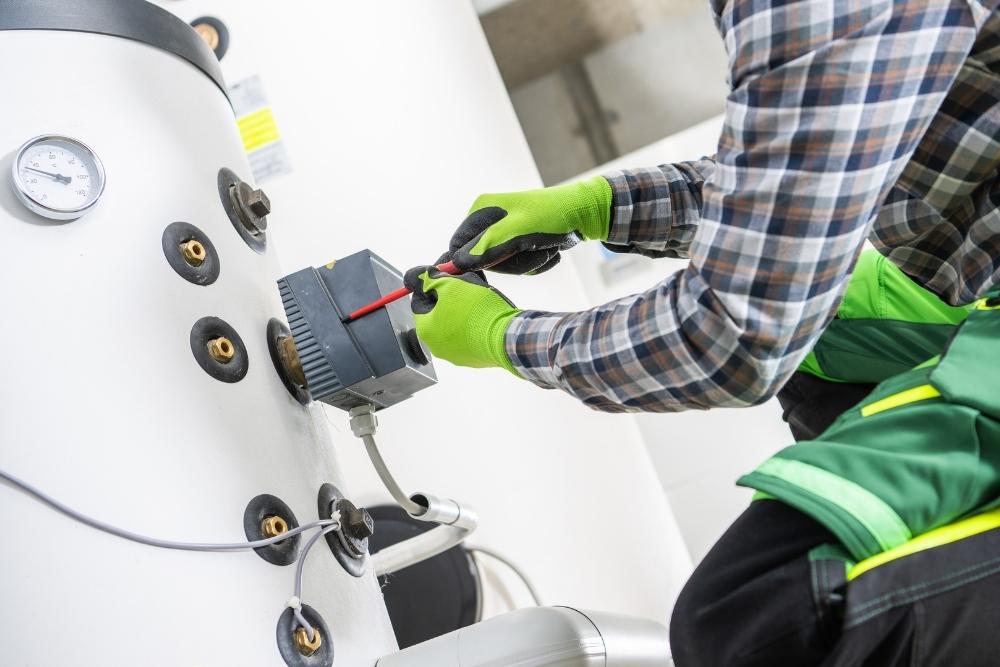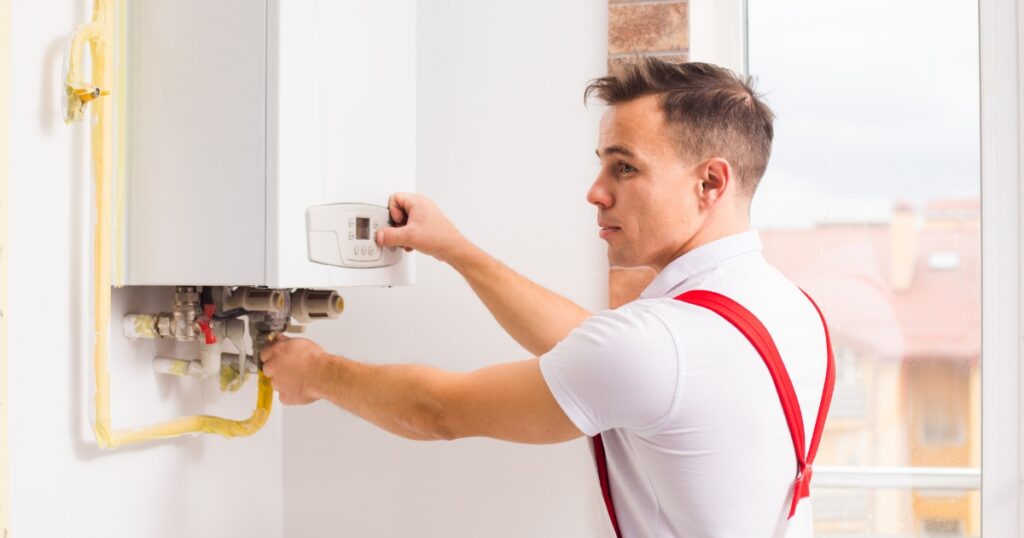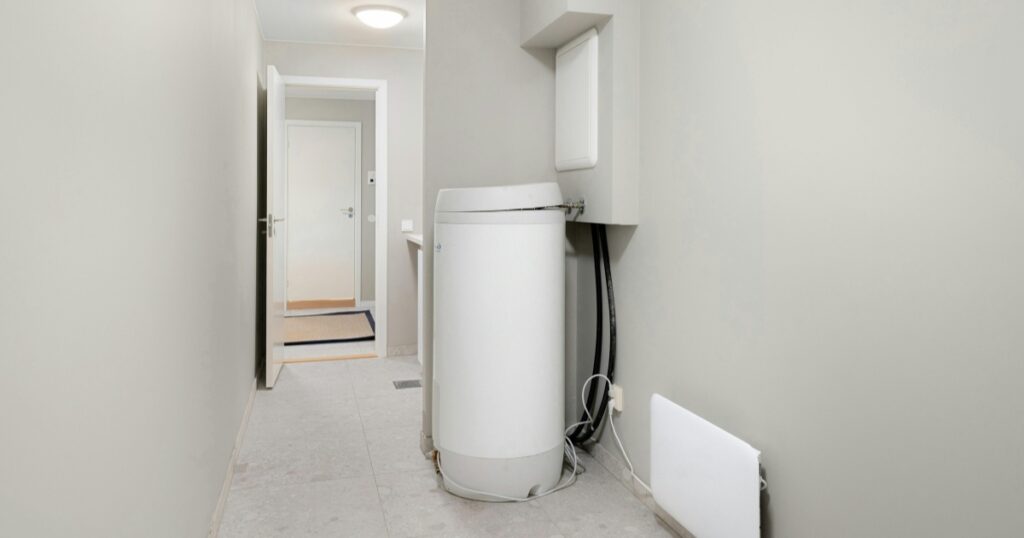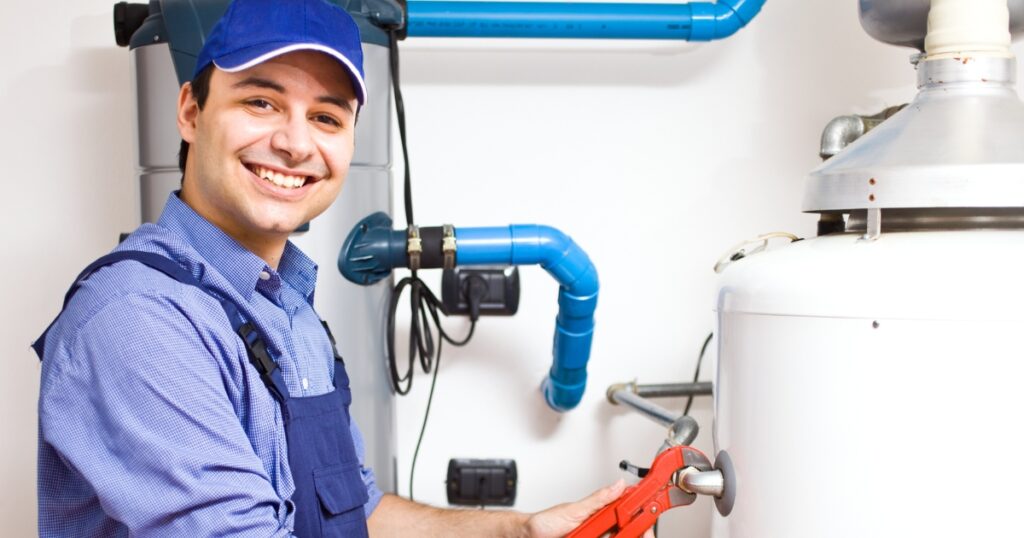Ever caught yourself wondering if your hot water heater is trying to belt out an Aussie rock anthem with all those clunks and hisses? Well, you’re in good company, mate – it’s a pretty common serenade that many of us wake up to.
More often than not, the culprit behind this unexpected household symphony is sediment getting too comfy at the bottom of your tank. So let’s roll up our sleeves and get stuck into sorting out this noisy bludger! Keep your peepers peeled on our guide as we help bring some peace and quiet back to your home sweet home.
Key Takeaways
- Rumbling or booming sounds from a hot water heater can indicate sediment buildup, requiring regular flushing to prevent disruptive noises and ensure efficient operation.
- Popping or crackling noises may result from mineral deposits in the tank, which can be minimised by flushing the water heater and installing a heat trap on the outlet pipe.
- Sizzling or hissing sounds could signal a leak, emphasising the importance of promptly addressing any potential leaks to prevent damage and noise disturbances.
Identifying Hot Water Heater Noises
Is your hot water heater making weird noises? Here are some common sounds to listen for:
- Rumbling or booming
- Popping or crackling
- Sizzling or hissing
- Ticking
- Screeching or screaming
- Banging or hammering
Rumbling or booming
We’ve all heard those unsettling rumbling or booming sounds coming from the water heater, and it’s usually a sign that we need to roll up our sleeves and get to work. Often, these noises hint at a buildup of sediment inside the tank.
The layers of minerals like calcium and magnesium can harden at the bottom when heated repeatedly, leading to that deep echoing sound as bubbles escape from beneath the sediment.
To tackle this noisy issue, flushing out your hot water system might be necessary. It helps clear out any gunk that has accumulated over time and prevents the mini-explosions that cause such rumbles.
Acting promptly ensures your water heater runs smoothly without turning into a makeshift volcano in your home. Keeping on top of maintenance is key; don’t wait until your peaceful shower soundtrack turns into an ominous boom!
Popping or crackling
After addressing rumbling or booming sounds, it’s essential to understand the causes and solutions for popping or crackling noises in your hot water heater. Popping or crackling sounds are often a result of the expansion and contraction of the water heater tank as it heats up and cools down.
This occurs due to mineral deposits settling at the bottom of the tank, causing excess heat that leads to these unsettling noises. Regular flushing of your water heater can help remove sediment buildup, preventing popping or crackling sounds from occurring.
Additionally, installing a heat trap on the hot water outlet pipe can also minimise these noises by directing cold water away from areas where it could cause disruptive sounds.
Sizzling or hissing
If you notice a sizzling or hissing sound coming from your water heater, it could be indicative of a leak. A high-pitched noise can signal that there is a leak either from the water heater or the pipes.
It’s crucial to address any leaks promptly, as they can result in water heater noise and potential damage if left unattended.
A sizzling or hissing sound might initially seem harmless, but it’s important to investigate the source and take action to prevent any further issues. Regularly inspecting your hot water heater for leaks can help mitigate potential damage and prolong its lifespan.
Ticking
After addressing sizzling or hissing noises, let’s move on to the ticking sounds that could be coming from your hot water heater. Ticking noises can often indicate a minor issue with your water heater, but it’s essential to address them promptly before they escalate into more significant problems.
In some cases, ticking may result from the expansion and contraction of pipes due to fluctuations in temperature. This can lead to loose pipes or inadequate insulation causing the ticking sound as they expand and contract.
Sediment buildup within the tank can also cause ticking as it interferes with the heating process, creating irregularities that produce noise. Additionally, a dripping faucet near a hot water pipe can create an annoying ticking sound when droplets hit its metal surface.
Screeching or screaming
When your hot water heater is screeching or screaming, this high-pitched noise can indicate excessive water pressure or a potential leak. It’s important to address this issue promptly to prevent any damage to the water heater or pipes.
Regular maintenance and checking for loose parts can help alleviate these noises and ensure that your hot water heater operates smoothly.
Installing pressure regulators can also help regulate the water pressure and reduce the likelihood of screeching or screaming sounds coming from your hot water heater. Be proactive in seeking professional help if needed, as addressing noisy water heaters promptly can save you time and money in the long run.
Banging or hammering
After addressing screeching or screaming noises in your water heater, it’s essential to investigate any banging or hammering sounds. These loud, disruptive noises are often caused by sediment buildup at the bottom of the tank.
As the water is heated, bubbles can form and rise through this sediment, creating a popping sound that resembles banging or hammering.
Banging or hammering noises from a hot water heater can be concerning for homeowners. The disturbance may signal excessive sediment accumulation within the tank, which not only causes noise but also reduces efficiency and shortens its lifespan.
Common Causes of Noises
Sediment buildup, water hammers, loose parts, and heat traps are common causes of hot water heater noises.
Sediment buildup
Sediment buildup in your water heater can lead to annoying knocking or hammering sounds.

Over time, minerals and debris settle at the bottom of the tank, creating a barrier that causes vibrations as the water heats up.
This sediment buildup not only creates noise but also reduces the efficiency of your water heater, leading to increased energy consumption. Regularly flushing the tank can help prevent sediment buildup and maintain a quieter, more efficient water heater.
Addressing sediment buildup is essential for keeping your hot water heater functioning properly and avoiding potential issues such as reduced heating capacity or premature wear and tear on the system.
Water hammers
If you’ve been experiencing knocking or banging sounds coming from your water heater, this may be due to a phenomenon known as water hammers. Water hammers occur when the flow of water in your plumbing system is suddenly shut off, causing a surge of pressure that results in loud, repetitive banging noises.
This can happen when a faucet or valve is closed too quickly, and the shock wave travels through the pipes and causes them to vibrate.
Addressing water hammers is essential not only for quieting your plumbing system but also for preventing potential damage to your pipes and appliances. Installing air chambers or water hammer arrestors can help absorb the excess pressure and minimise the impact of sudden shutoffs on your plumbing system.
Loose parts
Loose parts in your hot water heater can cause rattling or banging noises, signalling the need for immediate attention. Inspect the connections and fittings to ensure they are secure and tighten any loose components.
Additionally, regularly check the heating element and anode rod to make sure there is no excessive vibration due to loose fixtures. Addressing loose parts promptly will prevent further damage to your water heater system.
If left unattended, loose parts can lead to more serious problems such as leaks or damage to other components of the hot water heater. Regularly inspecting and tightening these parts will help maintain a quiet and efficient hot water system in your home.
Heat traps
After addressing any issues with loose parts in your water heater, it’s essential to also consider the impact of heat traps. Heat traps are valves installed on the hot and cold water lines connected to the water heater, designed to prevent excessive heat loss through convection or thermosiphon when the heater is not operating.
Heat traps can help improve energy efficiency by preventing unnecessary heat from escaping your system. By ensuring proper installation and maintenance of these valves, you can contribute to reducing energy consumption and potentially lowering your utility bills.
It’s important for homeowners to understand how their water heating systems work and how simple components like heat traps can make a difference in overall performance.
Troubleshooting and Fixing Noisy Hot Water Heaters
To troubleshoot and fix noisy hot water heaters, start by flushing the tank to remove the sediment buildup, fix any loose parts, regulate the water pressure, replace heat traps if necessary, and seek professional help if needed.
Flushing the tank
To maintain your water heater and reduce annoying noises, consider flushing the tank regularly. Follow these steps to flush the tank:
- Turn off the water heater and cut off the cold – water supply.
- Connect a garden hose to the drain valve on the heater and run it outside or into a bucket.
- Open the pressure relief valve at the top of the heater to allow air in as you drain it.
- Open the drain valve and let water flow out until it runs clear.
- Close the drain valve, remove the hose, and turn on the cold water supply.
- Wait for hot water to come out of a nearby faucet before turning on power to avoid damaging heating elements.
Fixing loose parts
To address hot water heater noise caused by loose parts, take the following steps:
- Inspect the water heater for any visibly loose components, such as pipe connections or fittings, and tighten them using appropriate tools to prevent rattling or banging noises.
- Check the heating elements inside the tank and ensure they are securely fastened in place; loose elements can create humming or vibration sounds.
- Examine the pressure relief valve for any signs of looseness, leaks, or improper sealing; make sure it is fitted properly and functioning effectively to prevent whistling or high-pitched screeching noises.
- Verify that all panels and covers on the water heater unit are securely in place to avoid any potential rattling or clanking sounds caused by loose enclosures.
- If you discover a loose part that cannot be easily tightened or fixed, consider seeking professional assistance to correctly address the issue and eliminate unwanted noises from your water heater.
Regulating water pressure
To regulate water pressure in your hot water heater, ensure that the pressure relief valve is functioning correctly. This prevents excessive pressure buildup inside the tank, which can cause whistling or high-pitched screeching noises. Additionally, consider installing a pressure regulator to maintain a consistent and safe water pressure level within the system. This helps prevent any potential damage or noisy disturbances due to fluctuating water pressure. Also, regularly checking and adjusting the pressure settings on the regulator can help maintain an optimal level for your water heater. Finally, if you notice any unusual noise or variation in water pressure, it’s essential to seek professional assistance promptly to address any underlying issues.
Replacing heat traps
To address heat trap-related hot water heater noises, you may consider replacing the heat traps. This can effectively resolve the issue and prevent further disturbances. Here are some steps to help you carry out this task:
- Turn off the power and shut off the water supply to the heater.
- Locate the heat traps which are typically found on top of the water heater or near the inlet and outlet pipes.
- Unscrew and remove the old heat traps carefully, ensuring no damage to any surrounding components.
- Clean the area where the old heat traps were located to ensure a smooth installation of new traps.
- Install new heat traps according to the manufacturer’s instructions.
- Reconnect all plumbing connections securely and turn on the water supply.
Seeking professional help
If you’re unsure about diagnosing or fixing your noisy water heater, it’s best to seek professional help. A licensed plumber has the expertise to accurately identify the cause of the noise and provide a safe and effective solution.
Professional plumbers can conduct a comprehensive inspection, diagnose the issue based on their experience, and implement appropriate repairs or maintenance. Additionally, they are equipped with specialised tools and knowledge to handle potentially hazardous situations such as high-pressure water leaks or gas-related problems.
So when faced with persistent water heater noises that you cannot resolve yourself, it’s advisable to enlist the assistance of a qualified professional who can ensure your hot water heater is operating safely and efficiently for your home.

Preventing Noises in Your Water Heater
Regular maintenance is key to preventing annoying noises in your water heater. Flushing the tank regularly, checking and fixing loose parts, and installing pressure regulators can help keep things running smoothly.
Regular maintenance
To maintain peace and quiet in your home, it’s essential to schedule regular water heater maintenance.
This upkeep includes flushing the tank regularly and checking for loose parts that may cause annoying banging or hammering sounds.
Installing pressure regulators can also help prevent excessive noise caused by water hammers. By staying on top of routine maintenance, you can avoid common causes of hot water heater noises like sediment buildup and ensure your system operates smoothly.
Homeowners should prioritise regular maintenance as it plays a crucial role in preventing noisy plumbing sounds related to their hot water heaters. Flushing the tank, checking for loose parts, and installing pressure regulators are simple tasks that can make a significant difference in maintaining a peaceful environment at home.
Flushing the tank regularly
To prevent sediment buildup in your water heater and reduce annoying noises, it’s important to flush the tank regularly. Sediment can accumulate over time, causing banging or knocking sounds as it gets heated and reheated.
Flushing the tank helps remove this buildup, ensuring that your water heater operates quietly and efficiently. Regular maintenance is key to preventing issues with your hot water heater, so don’t forget to schedule periodic tank flushing to keep things running smoothly.
By performing regular tank flushing, you can maintain a quiet and well-functioning water heater while also prolonging its lifespan. Sediment accumulation is a common cause of noisy water heaters, but with proper maintenance like regular flushing, you can mitigate these issues effectively.
Checking and fixing loose parts
After regularly flushing the tank, the next step in troubleshooting a noisy hot water heater is to check and fix any loose parts. Loose parts within the water heater can cause rattling, banging, or humming sounds.
The most common culprits include loose heating elements, fittings, or even the combustion chamber door. Once identified, these loose components can be tightened or properly secured to eliminate the noise they are creating.
Regularly checking for and fixing loose parts can help maintain a quiet and efficient water heater system.
It’s also crucial to remember that addressing loose parts promptly not only resolves irritating noises but also prevents potential damage to the overall functioning of your hot water heater.
Installing pressure regulators
To prevent unnecessary pressure on your hot water heater, consider installing pressure regulators. These simple devices help mitigate the impact of high water pressure, ensuring a steady and safe flow through your system.
By regulating the force at which water enters your heater, pressure regulators can significantly reduce the risk of loud banging or hammering noises caused by excessive water pressure.
This quick and affordable fix could save you from potential damage to your water heater and plumbing system. Regularly checking for and adjusting these regulators will ensure that they remain effective in maintaining safe operating conditions for your hot water system.






